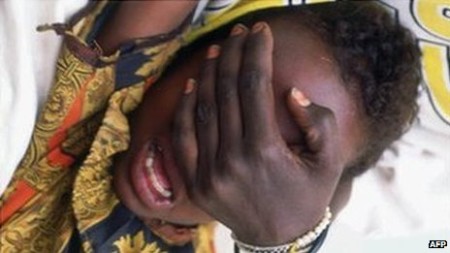Growing numbers of girls are running away from home to escape genital mutilation carried out during mass initiations in a remote, deeply traditional corner of northern Tanzania, according to reports.

In the Tarime district of the Mara region, which borders Kenya, the number of girls who fled these illegal rituals at the end of last year doubled to 634 from 312 the year before, according to girls’ rights campaigners.
Teenager Magdalena Lesedi, who narrowly escaped the knife when she ran away during a cutting ceremony at her home village in December, was horrified by what she saw.
“I was very shocked to see blood running down the leg of one of my friends who had just been cut. I couldn’t bear it, I had to run away,” she told the Thomson Reuters Foundation.
The 16-year-old said her grandmother had insisted she undergo the ancient ritual to bring her family respect within their community.
“I did not have any idea how it felt to be circumcised until I saw my friend who was very visibly in deep pain,” she said.
Lesedi is among thousands of girls who have sought refuge in recent years at a shelter in the village of Masanga, which is fighting to end female genital mutilation (FGM) in Tarime, one of the regions where the practice remains most prevalent. The refuge is guarded by police to prevent anyone snatching the girls away to mutilate them.
Up to 7.9 million girls and women in Tanzania are thought to have undergone FGM, which involves the removal of the clitoris and external genitalia. In Tarime, girls are usually cut between the ages of 12 and 17 in initiations performed by circumcisers known as ngariba, often using unclean knives and blades.
The girl is not expected to show any sign of fear throughout the excruciatingly painful ritual which happens amid cheers and ululating from the watching crowd.
Communities who support the practice say it purifies the girl and is a prerequisite for marriage. Kurya clan elders say the cutting is done to curb women’s sexual desire so that they do not stray when their husbands are away. Many Kurya men work as fishermen on Lake Victoria.
Although Tanzania made FGM illegal in 1998, the law is poorly enforced. FGM continues to be practised by many tribes putting thousands of girls at risk every year.
Internationally condemned as a gross rights abuse, FGM causes a host of serious physical and psychological problems. In extreme cases girls may bleed to death or die from infections, especially if blades are dirty and used on many girls.
Apart from providing a home, the Termination of Female Genital Mutilation (TFGM) Centre in Masanga teaches girls about reproductive health, the harmful effects of cutting and children’s rights.
“Some of the girls are in a terrible state of mental distress when they come. We sit with them and try to give them psychological counselling and make them feel good,” said the centre’s director Sister Germaine Baibika. Baibika said some girls are even brought to the refuge in secret by their parents to avoid pressure from clan elders and grandmothers during the annual cutting season which runs from November to December.
The centre, which is supported by the Children’s Dignity Forum charity and the United Nations Population Fund, also promotes an alternative rite of passage ceremony to replace FGM. The colourful occasions attract huge numbers from across the Kurya community, including traditional elders. The girls dress up and celebrate with singing and dancing.
As for her future, Lesedi doesn’t think the fact she has refused to be cut will hurt her marriage prospects because she says there is growing recognition that FGM is bad.
Women’s rights groups say the number of girls being cut is falling every year. “I think people realise FGM brings nothing other than pain and suffering to innocent girls,” said Valerie Msoka, head of women’s rights organisation Tamwa.
However campaigners say it is not enough to show communities that FGM is harmful. The ngariba earn money from each girl they cut so they need to have an alternative income source or they will not lay down their knives. The Masanga centre is training them in skills such as batik-making.
Maria Wekwe, a 51-year-old grandmother, said she had secretly cut hundreds of girls during nearly 20 years as a ngariba, charging parents 15,000 shillings (£5) for each girl and cutting at least 32 girls a season.
“I inherited this job from my grandmother, but I have decided to wash my hands of it because I realise that I have caused a lot of pain and suffering to so many people,” she said.










